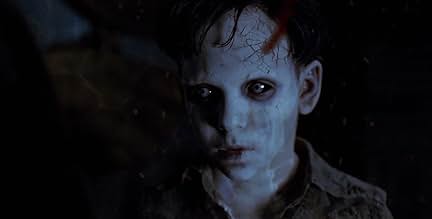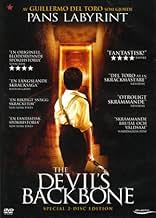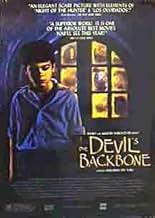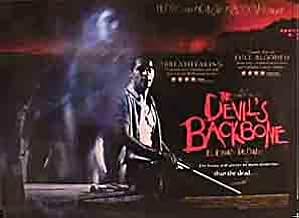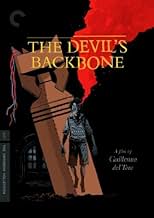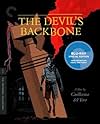NOTE IMDb
7,4/10
74 k
MA NOTE
Après son arrivée dans un sinistre orphelinat pour garçons, Carlos, un jeune garçon de 12 ans dont le père est mort pendant la guerre civile espagnole, découvre que l'école est hantée et cac... Tout lireAprès son arrivée dans un sinistre orphelinat pour garçons, Carlos, un jeune garçon de 12 ans dont le père est mort pendant la guerre civile espagnole, découvre que l'école est hantée et cache beaucoup de sombres secrets qu'il lui faut absolument découvrir.Après son arrivée dans un sinistre orphelinat pour garçons, Carlos, un jeune garçon de 12 ans dont le père est mort pendant la guerre civile espagnole, découvre que l'école est hantée et cache beaucoup de sombres secrets qu'il lui faut absolument découvrir.
- Réalisation
- Scénario
- Casting principal
- Récompenses
- 6 victoires et 11 nominations au total
Francisco Maestre
- El Puerco
- (as Paco Maestre)
Javier Bódalo
- Búho
- (as Javier González Madrigal)
Avis à la une
10Libretio
THE DEVIL'S BACKBONE (El Espinazo del Diablo)
Aspect ratio: 1.85:1
Sound format: Dolby Digital
During the Spanish Civil War, a young orphan boy (Fernando Tielve) is sent to an isolated boarding school where he encounters the ghost of a murdered child (Junio Valverde) who warns him of impending disaster...
A masterpiece. Filmed in Spain by writer-director Guillermo del Toro following his unhappy Hollywood debut (MIMIC), this spellbinding melodrama works both as an examination of the political turmoil which characterized the Spanish Civil War, and as a simple ghost story in which a tragic spirit seeks vengeance for a terrible crime. Employing restless camera-work and atmospheric set designs to their best advantage, del Toro visualizes his own script (co-written with Antonio Trashorras and David Muñoz) as the story of a vulnerable child cast adrift in a strange new world, where he must contend not only with everyday problems (such as the school bully, Ínigo Garcés, whose motives are rather more complex than they first appear), but also his frequent encounters with the unhappy ghost, some of which are genuinely unsettling (watch out for the heart-stopping sequence in which Tielve is besieged in a closet by the enraged phantom).
Production values are first-class throughout, ranging from César Macarrón's evocative art direction and Salvador Mayolas' ultra-creepy sound design, through to Luis de la Madrid's crisp editing skills and Javier Navarrete's unforgettable music score. Visual effects and makeup designs are also superb, though deliberately underplayed for maximum emotional effect. The cast is toplined by Spanish movie veterans Marisa Paredes (a favorite of Pedro Almodóvar) and Federico Luppi (CRONOS), and there are impressive turns by Irene Visedo as a young woman whose loyalties are divided by circumstances, and rising star Eduardo Noriega (the Spanish equivalent of Brad Pitt) as Visedo's boyfriend, an orphan-turned-caretaker whose volatile nature leads to a dramatic conclusion, with appalling consequences for everyone around him. Tielve is magnificent as the wide-eyed innocent at the center of the narrative, and Garcés is every bit his equal as the bully who reclaims his dignity during a climactic showdown with the forces of evil. Released around the same time as THE OTHERS (2001) - another Spanish ghost story, filmed in English as a vehicle for Nicole Kidman - THE DEVIL'S BACKBONE was consigned to Art-house distribution by virtue of its status as a subtitled movie and suffered a comparative loss at the US box-office, though del Toro's magical fever dream is unquestionably the better of the two films.
(Spanish dialogue)
Aspect ratio: 1.85:1
Sound format: Dolby Digital
During the Spanish Civil War, a young orphan boy (Fernando Tielve) is sent to an isolated boarding school where he encounters the ghost of a murdered child (Junio Valverde) who warns him of impending disaster...
A masterpiece. Filmed in Spain by writer-director Guillermo del Toro following his unhappy Hollywood debut (MIMIC), this spellbinding melodrama works both as an examination of the political turmoil which characterized the Spanish Civil War, and as a simple ghost story in which a tragic spirit seeks vengeance for a terrible crime. Employing restless camera-work and atmospheric set designs to their best advantage, del Toro visualizes his own script (co-written with Antonio Trashorras and David Muñoz) as the story of a vulnerable child cast adrift in a strange new world, where he must contend not only with everyday problems (such as the school bully, Ínigo Garcés, whose motives are rather more complex than they first appear), but also his frequent encounters with the unhappy ghost, some of which are genuinely unsettling (watch out for the heart-stopping sequence in which Tielve is besieged in a closet by the enraged phantom).
Production values are first-class throughout, ranging from César Macarrón's evocative art direction and Salvador Mayolas' ultra-creepy sound design, through to Luis de la Madrid's crisp editing skills and Javier Navarrete's unforgettable music score. Visual effects and makeup designs are also superb, though deliberately underplayed for maximum emotional effect. The cast is toplined by Spanish movie veterans Marisa Paredes (a favorite of Pedro Almodóvar) and Federico Luppi (CRONOS), and there are impressive turns by Irene Visedo as a young woman whose loyalties are divided by circumstances, and rising star Eduardo Noriega (the Spanish equivalent of Brad Pitt) as Visedo's boyfriend, an orphan-turned-caretaker whose volatile nature leads to a dramatic conclusion, with appalling consequences for everyone around him. Tielve is magnificent as the wide-eyed innocent at the center of the narrative, and Garcés is every bit his equal as the bully who reclaims his dignity during a climactic showdown with the forces of evil. Released around the same time as THE OTHERS (2001) - another Spanish ghost story, filmed in English as a vehicle for Nicole Kidman - THE DEVIL'S BACKBONE was consigned to Art-house distribution by virtue of its status as a subtitled movie and suffered a comparative loss at the US box-office, though del Toro's magical fever dream is unquestionably the better of the two films.
(Spanish dialogue)
A beautiful, atmospheric story about a haunted orphanage. To date, I think it's Del Toro's most "complete" film, combining his trademark visuals with a very touching story about war, death, guilt and grief - and ultimately hope.
Like 'Pan's Labyrinth' the story is set against the backdrop of the Spanish civil war (although here the war serves merely as a background noise). The film is so beautifully shot that I would recommend it even to people who don't normally like ghost stories (it does have some scary moments, mind); this one transcends the horror genre. 8 stars out of 10.
In case you're interested in more underrated masterpieces, here's some of my favorites:
imdb.com/list/ls070242495
Like 'Pan's Labyrinth' the story is set against the backdrop of the Spanish civil war (although here the war serves merely as a background noise). The film is so beautifully shot that I would recommend it even to people who don't normally like ghost stories (it does have some scary moments, mind); this one transcends the horror genre. 8 stars out of 10.
In case you're interested in more underrated masterpieces, here's some of my favorites:
imdb.com/list/ls070242495
THE DEVIL'S BACKBONE is a Spanish language supernatural thriller. It consists of a haunted school for orphaned boys. Now, in an American film that would be all you get, a ghost running around scaring the young inhabitants of the gloomy building. That's it, and it would not be scary at all. It is to the credit that the makers of THE DEVIL'S BACKBONE present the actual ghost as the least frightening aspect of the film; he becomes, in fact, the moral center of a deeply complex story.
In Spain, the year is 1939 and Franco's army is advancing towards the small village where the most notable landmark is an impotent bomb jutting out of the ground in the center of the town. A child, Carlos (Fernando Tielve), his father's life taken in the bloody civil war, finds refuge with the Leftist caretakers of the school. Not a good place to be around at that time. He finds himself under the wing of Prof. Casares (Fererico Luppi), a strange intellectual who fears the oncoming dirge of Franco's forces. There is also some intrigue involving the caretaker Jacinto (Edvardo Noriega) and the revolution's small supply of gold. Oh, right and there is a troubled spirit of one of the dead children creeping through the bowls of the school, uttering ominous warnings to young Carlos ("Many of you will die.")...
It is one of the strongest elements of THE DEVIL'S BACKBONE that it does not become distracted by the ghost story, I mean what is one ghost compared to the very real fears of war, death, greed, abandonment, political persecution, abuse at the hands of adults, lust, and acceptance. A spirit cannot hurt us, it does not exist on the same plain of the living. His life has ended and he can no longer be troubled by the reality the characters face. A bullet or explosion wil not penetrate his flesh, he no longer feels pain. The boys who survive him are those who have to struggle for their small place on this earth.
The film paints in detailed strokes and does not cut corners when it comes to the emotions involved in the plot. The characters are not pawns to be startled periodically by cats or loud noises, they just happen to occupy the same space with a sad and restless dead boy.
The director, Guillermo Del Toro (CRONOS, MIMIC, the better-than-the-original-but-that-ain't-saying-much BLADE 2), handles the material very well, never losing sight of the story he has set out to tell. The metaphors he uses (the bomb, the pool, the contents of the jars) are rich and creative. Del Toro, along with his crew and actors, create moments of intense fear and unsettling action; the musical score, by Javier Navarette, is particularly effective. The film is dark and gloomy (perhaps overly so at times), but never succumbs to the easy answers in the shadows. As for the American films it will be compared to: THE OTHERS-not scary, THE RING-not scary, DARKNESS FALLS-not scary...THE DEVIL'S BACKBONE is scary, complex and ultimately memorable.
8/10.
In Spain, the year is 1939 and Franco's army is advancing towards the small village where the most notable landmark is an impotent bomb jutting out of the ground in the center of the town. A child, Carlos (Fernando Tielve), his father's life taken in the bloody civil war, finds refuge with the Leftist caretakers of the school. Not a good place to be around at that time. He finds himself under the wing of Prof. Casares (Fererico Luppi), a strange intellectual who fears the oncoming dirge of Franco's forces. There is also some intrigue involving the caretaker Jacinto (Edvardo Noriega) and the revolution's small supply of gold. Oh, right and there is a troubled spirit of one of the dead children creeping through the bowls of the school, uttering ominous warnings to young Carlos ("Many of you will die.")...
It is one of the strongest elements of THE DEVIL'S BACKBONE that it does not become distracted by the ghost story, I mean what is one ghost compared to the very real fears of war, death, greed, abandonment, political persecution, abuse at the hands of adults, lust, and acceptance. A spirit cannot hurt us, it does not exist on the same plain of the living. His life has ended and he can no longer be troubled by the reality the characters face. A bullet or explosion wil not penetrate his flesh, he no longer feels pain. The boys who survive him are those who have to struggle for their small place on this earth.
The film paints in detailed strokes and does not cut corners when it comes to the emotions involved in the plot. The characters are not pawns to be startled periodically by cats or loud noises, they just happen to occupy the same space with a sad and restless dead boy.
The director, Guillermo Del Toro (CRONOS, MIMIC, the better-than-the-original-but-that-ain't-saying-much BLADE 2), handles the material very well, never losing sight of the story he has set out to tell. The metaphors he uses (the bomb, the pool, the contents of the jars) are rich and creative. Del Toro, along with his crew and actors, create moments of intense fear and unsettling action; the musical score, by Javier Navarette, is particularly effective. The film is dark and gloomy (perhaps overly so at times), but never succumbs to the easy answers in the shadows. As for the American films it will be compared to: THE OTHERS-not scary, THE RING-not scary, DARKNESS FALLS-not scary...THE DEVIL'S BACKBONE is scary, complex and ultimately memorable.
8/10.
10Gafke
The year is 1939. The Spanish Civil War is nearing its bloody end. Ten year old Carlos, the orphaned son of a slain Republican, is left by his tutor at an isolated orphanage for boys. The school is destitute, barely able to provide enough food for the children, but headmistress Carmen and Dr. Casares do the best they can. Carlos accepts his fate bravely, but there are still school bullies to contend with, an unexploded bomb sitting in the courtyard as a constant reminder of the war which still rages, and an abusive caretaker named Jacinto who has his own secret agenda. As if that were not enough, a ghost begins stalking Carlos, the ghost of a boy named Santi whose demise is shrouded in mystery and who solemnly warns Carlos that many will soon die. As the war begins closing in on the orphanage, violence erupts within and Santi's prediction comes sadly true. But the worst has not yet happened. The abandoned boys must band together if they hope to survive, and the dead will aid their cause if they are to be avenged.
This is a beautiful movie, absolutely gorgeous from start to finish. The dusty, isolated landscape is a ghost itself and the constant threat of violence - from the war, to the bullies and, of course, from the traitorous Jacinto - gives this film an unrelenting atmosphere of tension and dread. The acting is superb, from the children as well as the adults. Federico Luppi as Dr. Casares is superb, providing us with a true hero, a gentleman of class and compassion. Eduardo Noriega is perfectly cast as the despicable Jacinto, making you despise him more and more as the film progresses. This is not just a ghost story, though the figure of Santi is central and key to everything that happens. It is a tale of love and honor as well as horror and ruin. It is a coming of age story and an adult drama. It also manages to be scary as hell when it wants to be.
Guillermo del Toro has made a masterpiece with "The Devils Backbone." Ten stars for this hauntingly lovely epic.
This is a beautiful movie, absolutely gorgeous from start to finish. The dusty, isolated landscape is a ghost itself and the constant threat of violence - from the war, to the bullies and, of course, from the traitorous Jacinto - gives this film an unrelenting atmosphere of tension and dread. The acting is superb, from the children as well as the adults. Federico Luppi as Dr. Casares is superb, providing us with a true hero, a gentleman of class and compassion. Eduardo Noriega is perfectly cast as the despicable Jacinto, making you despise him more and more as the film progresses. This is not just a ghost story, though the figure of Santi is central and key to everything that happens. It is a tale of love and honor as well as horror and ruin. It is a coming of age story and an adult drama. It also manages to be scary as hell when it wants to be.
Guillermo del Toro has made a masterpiece with "The Devils Backbone." Ten stars for this hauntingly lovely epic.
This is not just an incredibly effective ghost story, but a cinematic masterpiece. Like his "Cronos," Del Toro has created a rich horror fable that is driven by 3-dimensional characters involved in a fascinating plot that leads to a wholly satisfying ending. With many developments along the way that shock, move, and thrill. And of course the political allegory and reality of the film, the Spanish Civil War, all the orphan boys of noble Loyalist fighters fighting their own war against a truly horrifying fascist villain, the young and handsome Jacinto, who is not without a sad ghost in his own past that feeds his destructiveness.
Del Toro is one of the most intelligent and humane directors working today, not something usually said about auteur in the horror genre. I have not seen "Hellboy" but think less of his US endeavors than these two Spanish masterworks...
Del Toro is one of the most intelligent and humane directors working today, not something usually said about auteur in the horror genre. I have not seen "Hellboy" but think less of his US endeavors than these two Spanish masterworks...
Le saviez-vous
- AnecdotesDescribed by Guillermo del Toro as being a sibling film to Le Labyrinthe de Pan (2006) (this being the masculine "brother" film, and Pan's as the feminine "sister" film).
- GaffesThe amount of gold Jacinto puts in his pockets and ties to his belt would probably pull his pants off and definitely make it impossible for him to stand and walk the way he does.
- Crédits fousDuring the opening credits sequence, the letters of the film's title can be seen floating around the preserved fetuses. Eventually, the letters come together to form the title.
- ConnexionsFeatured in The 100 Scariest Movie Moments: Part II: 75-51 (2004)
- Bandes originalesUna lágrima
Written by Eugenio Cardenas (as E. Cardenas) and Nicolás Verona (as N. Verona)
Performed by Carlos Gardel
Courtesy Blue Moon Producciones Discograficas
Meilleurs choix
Connectez-vous pour évaluer et suivre la liste de favoris afin de recevoir des recommandations personnalisées
Détails
- Date de sortie
- Pays d’origine
- Sites officiels
- Langue
- Aussi connu sous le nom de
- El espinazo del diablo
- Lieux de tournage
- Sociétés de production
- Voir plus de crédits d'entreprise sur IMDbPro
Box-office
- Budget
- 4 500 000 $US (estimé)
- Montant brut aux États-Unis et au Canada
- 755 249 $US
- Week-end de sortie aux États-Unis et au Canada
- 34 963 $US
- 25 nov. 2001
- Montant brut mondial
- 6 582 065 $US
- Durée
- 1h 46min(106 min)
- Couleur
- Mixage
- Rapport de forme
- 1.85 : 1
Contribuer à cette page
Suggérer une modification ou ajouter du contenu manquant








